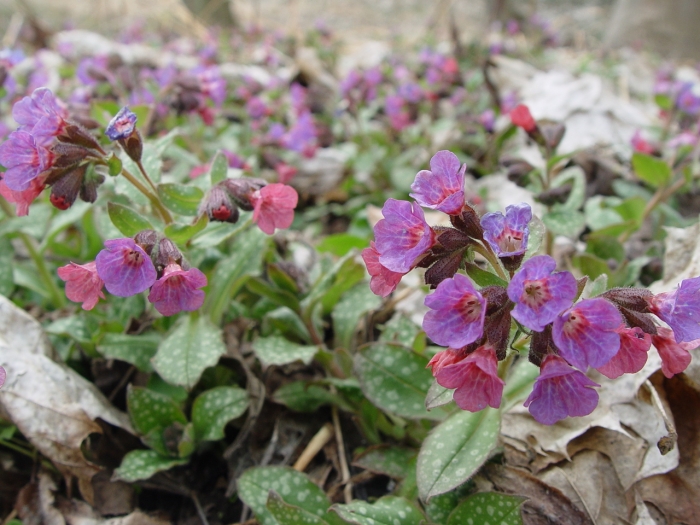Lungwort
(Pulmonaria officinalis)
Lungwort (Pulmonaria officinalis)
/
/

© Grzegorz Grzejszczak
CC BY-SA 4.0
Image By:
© Grzegorz Grzejszczak
Recorded By:
Copyright:
CC BY-SA 4.0
Copyright Notice:
Photo by: © Grzegorz Grzejszczak | License Type: CC BY-SA 4.0 | License URL: http://creativecommons.org/licenses/by-sa/4.0/ | Uploader: grzegorz_grzejszczak | Publisher: iNaturalist |






















Estimated Native Range
Summary
Pulmonaria officinalis, commonly known as lungwort, is a herbaceous evergreen perennial native to the understory of deciduous and mixed forests, often found in the damp, shaded areas of woodlands across Europe. It thrives in a range of elevations from lowlands to mountains. Lungwort prefers nutrient-rich, moist, well-drained soils that are slightly alkaline (calcareous). The plant typically grows to a height of 9 to 12 inches (23 to 30 cm) and spreads up to 18 inches (45 cm). Its foliage is distinctive, with dark green leaves speckled with white spots, providing an attractive ground cover throughout the year.
Lungwort is celebrated for its bicolored flowers, which bloom in early spring and change color from red or pink to blue-purple as they mature, indicating the presence of pH-sensitive anthocyanin pigments. This feature, along with its low maintenance and tolerance for shade, makes it a popular choice for woodland gardens, shaded borders, and underplanting beneath deciduous trees. It requires consistent moisture but is otherwise easy to care for. Lungwort is also valued for its historical medicinal use, believed to treat lung diseases due to its lung-shaped leaves, a concept known as the doctrine of signatures. While it is not commonly used in modern herbal medicine, it remains a plant of interest for its unique appearance and folklore. Potential problems include mildew and slugs, especially in overly moist conditions. Gardeners should be aware that lungwort can self-seed and spread, though it is not typically aggressive.CC BY-SA 4.0
Lungwort is celebrated for its bicolored flowers, which bloom in early spring and change color from red or pink to blue-purple as they mature, indicating the presence of pH-sensitive anthocyanin pigments. This feature, along with its low maintenance and tolerance for shade, makes it a popular choice for woodland gardens, shaded borders, and underplanting beneath deciduous trees. It requires consistent moisture but is otherwise easy to care for. Lungwort is also valued for its historical medicinal use, believed to treat lung diseases due to its lung-shaped leaves, a concept known as the doctrine of signatures. While it is not commonly used in modern herbal medicine, it remains a plant of interest for its unique appearance and folklore. Potential problems include mildew and slugs, especially in overly moist conditions. Gardeners should be aware that lungwort can self-seed and spread, though it is not typically aggressive.CC BY-SA 4.0
Plant Description
- Plant Type: Herb
- Height: 0.5-1 feet
- Width: 1-1.5 feet
- Growth Rate: Slow, Moderate
- Flower Color: Blue, Pink, Red
- Flowering Season: Spring
- Leaf Retention: Deciduous, Semi-deciduous
Growth Requirements
- Sun: Full Shade
- Water: Medium
- Drainage: Medium
Common Uses
Border Plant, Butterfly Garden, Deer Resistant, Groundcover, Low Maintenance, Rabbit Resistant, Street Planting
Natural Habitat
Damp, shaded areas of woodlands, often in nutrient-rich, moist, well-drained, slightly alkaline soils
Other Names
Common Names: Lungwort, Our Lady’s Milk Drops, Boys-And-Girls, Common Lungwort, Hundreds-And-Thousands, Jerusalem Cowslip, Jerusalem-Sage, Joseph-And-Mary
Scientific Names: , Pulmonaria officinalis, Pulmonaria maculosa,
GBIF Accepted Name: